Big Tech
Big Tech,[1] also known as GAFA, the Tech Giants,[2] Big Four,[3] Four Horsemen,[4][5] Big Five,[6] or S&P 5,[7][8][9] are the largest and most dominant companies in the information technology industry of the United States, namely Amazon, Apple, Google, Facebook, and Microsoft. Since the end of the 2000s, these five have been, besides Saudi Aramco, Tesla, and Tencent, the most valuable public companies globally,[10] with each having had a maximum market capitalization ranging from around $500 billion to around $2 trillion USD at various times.[11]
| Industry | Information technology |
|---|---|
Area served | United States |
Key people | Jeff Bezos Sundar Pichai Mark Zuckerberg Satya Nadella Tim Cook |
| Products |
|
Some have speculated it may not be possible to live in the digital world day-to-day outside of the ecosystem created by these companies,[12] and concerns over monopolistic practices have led to antitrust investigations from the Department of Justice and Federal Trade Commission in the United States,[13][14][15] and the European Commission.[16] Commentators have questioned the impact of these companies on privacy, market power, free speech and censorship, and national security and law enforcement.[17] On the other hand, by providing free services to consumers, they remain popular.[18] In particular, Facebook and Google offer almost all of their services for free. For example, a free Google account allows users to host websites, search the web, watch YouTube, and save documents, slideshows, spreadsheets and more via cloud storage. [19]
Membership and definitions
The term Big Tech is often broken down into more specific sub-groupings, often referred to by the following names or acryonyms.[20] Alphabet Inc., the parent company of Google, is often abbreviated using a "G" in these acronyms.
The Four
Alphabet, Amazon, Facebook, and Apple are commonly referred to as GAFA, the Big Four, or colloquially as the Four Horsemen.[21][22][23][24] Former Google CEO Eric Schmidt, author Phil Simon, and NYU professor Scott Galloway have each grouped the GAFA companies together, on the basis that those companies have driven major societal change via their dominance and role in online activities. This is unlike other large tech companies such as Microsoft and IBM, according to Simon and Galloway.[23] Eric Schmidt has excluded Microsoft from the grouping, noting that "Microsoft is not driving the consumer revolution in the minds of the consumers."[26]
GAFAM or FAAMG
A more inclusive grouping referred to as GAFAM, the Big Five, or FAAMG, defines Alphabet, Amazon, Facebook, Apple, and Microsoft as the tech giants.[27][28][29][30] Besides Saudi Aramco, the GAFAM companies are the five most valuable public corporations in the world as measured by market capitalization.[10] Nikos Smyrnaios justified the GAFAM grouping as an oligopoly that appears to take control of the Internet by concentrating market power, financial power and using patent rights and copyright within a context of capitalism.[31] Sometimes, the Big Five are referred to as the FAAAM stocks, where the letters are rearranged and Alphabet is abbreviated using an "A" instead of a "G."[32]
FAANG
FAANG refers to the five prominent American technology companies: Facebook, Amazon, Apple, Netflix, and Alphabet (GOOG).[33][34] The term was coined by Jim Cramer, the television host of CNBC's Mad Money in 2013, calling these companies "totally dominant in their markets."[35] Until 2017, FANG was limited to Facebook, Amazon, Netflix, and Alphabet. Another variant of this acronym is "FANGAM," which includes Microsoft.[36]
BATX
"BATX" refers specifically to the largest internet companies in China:[37] Baidu, Alibaba, Tencent, and Xiaomi.[38][39] BATX are among the first tech companies started in the 2000s during the Chinese tech revolution, and became widely used among Chinese netizens. Other Chinese tech companies like Huawei, DiDi, JD.com and ByteDance started later and seek to challenge the biggest tech giants.[40][41]
Market dominance
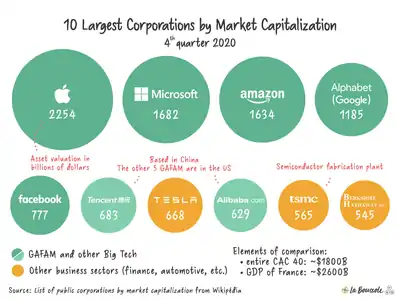
Amazon is the dominant market leader in e-commerce with 50% of all online sales going through the platform; cloud computing, with nearly 32% market share, and live-streaming with Twitch owning 75.6% market share. Amazon is additionally the market leader in the area of artificial Intelligence-based personal digital assistants and smart speakers (Amazon Echo) with 69% market share followed by Google (Google Nest) at 25% market share. Apple sells high-margin smartphones and other consumer electronics devices, sharing a duopoly with Google in the field of mobile operating systems: 27% of the market share belonging to Apple (iOS) and 72% to Google (Android).[42][43] Alphabet, Facebook and Amazon have been referred to as the "Big Three" of digital advertising.[44] In addition to social networking, Facebook also dominates the functions of online image sharing (Instagram) and online messaging (WhatsApp). Google is the leader in online search (Google Search), online video sharing (YouTube) and online mapping-based navigation (Google Maps). Microsoft continues to dominate in desktop operating system market share (Microsoft Windows)[45] and in office productivity software (Microsoft Office). Microsoft is also the second biggest company in the cloud computing industry (Microsoft Azure),[46] after Amazon, and is also one of the biggest players in the video game industry (Xbox).
The tech giants have replaced the energy giants such as Exxon Mobil, BP, Gazprom, PetroChina and Royal Dutch Shell ("Big Oil") from the first decade of the 21st century at the top of the NASDAQ stock index. They have also outpaced the traditional big media companies such as Disney, AT&T, and Comcast ("Big Media") by a factor of 10.[47] In 2017, the five biggest American IT companies had a combined valuation of over $3.3 trillion, and made up more than 40 percent of the value of the Nasdaq 100.[42]
Causes
Smyrnaios argued in 2016 that four characteristics were key in the emergence of GAFA: the theory of media and information technology convergence, financialization, economic deregulation and globalization.[31] He argued that the promotion of technology convergence by people such as Nicholas Negroponte made it appear credible and desirable for the Internet to evolve into an oligopoly. Autoregulation and the difficulty of politicians to understand software issues made governmental intervention against monopolies ineffective. Financial deregulation led to GAFA's big profit margins (all four except for Amazon had about 20–25 percent profit margins in 2014 according to Smyrnaios).
Globalization
According to Smyrnaios, globalization has allowed GAFAM to minimize its global taxation load and pay international workers much lower wages than would be required in the United States.[31]
Oligopoly maintenance
Smyrnaios argued in 2016 that GAFA combines six vertical levels of power, data centers, internet connectivity, computer hardware including smartphones, operating systems, Web browsers and other user-level software, and online services. He also discussed horizontal concentration of power, in which diverse services such as email, instant messaging, online searching, downloading and streaming are combined internally within any of the GAFA members.[31] For example Google and Microsoft pay to have their web search engines appear as first and second in Apple's iPhone.[48]
Antitrust investigations
United States
In 2019 and 2020, the Big Tech industry become center of antitrust attention from the United States Department of Justice and the United States Federal Trade Commission that included requests to provide information about prior acquisitions and potentially anticompetitive practices. Some Democratic candidates running for president proposed plans to break up Big Tech companies and regulate them as utilities. "The role of technology in the economy and in our lives grows more important every day," said FTC Chairman Joseph Simons. "As I’ve noted in the past, it makes sense for us to closely examine technology markets to ensure consumers benefit from free and fair competition."[49][50]
The spirit of the antitrust law is to protect consumers from the anticompetitive behavior of businesses that have either monopoly power in their market or companies that have banded together to exert cartel market behavior. Monopoly or cartel collusion creates market disadvantages for consumers. However, the antitrust law clearly distinguishes between purposeful monopolies and businesses that found themselves in a monopoly position purely as the result of business success. The purpose of the antitrust law is to stop businesses from deliberately creating monopoly power.[51]
Consumer welfare, not assumptions that large firms are automatically harmful to competition, should be the core consideration of any antitrust action. The consumer welfare standard serves as the "good reason" in antitrust enforcement as it appropriately looks at the impact on consumers and economic efficiency.[52] So far, it is not apparent that there has been a harm to consumer welfare and many technology companies continue to innovate and are bringing real benefits to consumers.[53]
Discussions of antitrust policy are often clouded by common myths about this widely misunderstood area of the law. For example, the Sherman Antitrust Act of 1890 criminalizes monopolistic business practices, specifically agreements that restraint of trade or commerce. At the same time, the Sherman Act allows organic creation of legitimately successful businesses that gain honest profits from consumers. The Act's main function is to preserve a competitive marketplace. The Big Tech companies are large and successful companies, but success alone is not reason enough for antitrust action. A legitimate breach of antitrust law must be the cause of any action against a business. Antitrust law doesn't condemn a firm for developing a universally popular search engine, such as Google, even if that success leads to market dominance. It's how a monopoly is obtained or preserved that matters — not its mere existence.[54]
The correlation between alleged anticompetitive behavior and questionable online privacy practices is also far from clear. Antitrust law is narrowly tailored to protect consumers from business conduct that harms the competitive process itself. Questionable practices that relate to privacy, however, may require their own regulatory framework of online privacy laws.[54]
The United States House Judiciary Subcommittee on Antitrust, Commercial and Administrative Law began investigating Big Tech on an antitrust basis in June 2020, and published a report in January 2021 concluding that Apple, Amazon, Facebook, and Google each operating in antitrust manners that requires some type of corrective action that either could be implemented through Congressional action or through legal actions taken by the Department of Justice, including the option of splitting up these companies.[55][56]
European Union
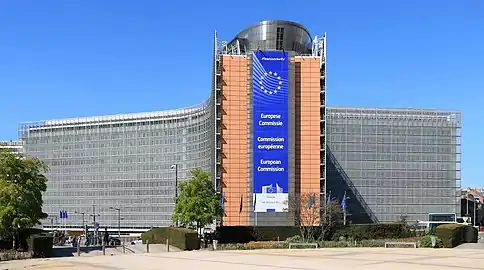
In June 2020, the European Union opened two new antitrust investigations into practices by Apple. The first investigation focuses on issues including whether Apple is using its dominant position in the market to stifle competition using its Apple music and book streaming services. The second investigation focuses on Apple Pay, which allows payment by Apple devices to brick and mortar vendors. Apple limits the ability of banks and other financial institutions to use the iPhones' near field radio frequency technology.[57][58]
Fines are insufficient to deter anti-competitive practices by high tech giants, according to European Commissioner for Competition Margrethe Vestager. Commissioner Vestager explained, "fines are not doing the trick. And fines are not enough because fines are a punishment for illegal behaviour in the past. What is also in our decision is that you have to change for the future. You have to stop what you're doing."[59]
Opposition
Scott Galloway has criticized the companies for "avoid[ing] taxes, invad[ing] privacy, and destroy[ing] jobs",[60] while Smyrnaios has described the group as an oligopoly, coming to dominate the online market through anti-competitive practices, ever-increasing financial power, and intellectual property law.[31] He has argued that the current situation is the result of economic deregulation, globalization, and the failure of politicians to understand and respond to developments in technology.
Smyrnaios recommended developing academic analysis of the political economy of the Internet in order to understand the methods of domination and to criticize these methods in order to encourage opposition to that domination.[31]
Use of externally generated content
On May 9, 2019, the Parliament of France passed a law intended to force GAFA to pay for related rights (the reuse of substantial amounts of text, photos or videos), to the publishers and news agencies of the original materials. The law is aimed at implementing Article 15 of the Directive on Copyright in the Digital Single Market of the European Union.[61]
Accusations of censorship and election interference
The practice of banning the hate speech has also received public criticism because it supposedly targets conservatives. However, the research didn't prove that conservatism is silenced on major social media platforms.[62]
In July 2020, United States House Judiciary Subcommittee on Antitrust, Commercial and Administrative Law held congressional hearing of CEOs of Alphabet, Amazon, Apple and Facebook, where some members of the subcommitte raised concerns about bias against conservatives and christians. U.S. representative for Florida's 1st congressional district Matt Gaetz has challanged CEO of Amazon Jeff Bezos to "divorce from SPLC" due to the practice of preventing religious-liberty organizations from collecting donations because of their designation as a hate group by SPLC over their opposition to homosexuality.[63] U.S. representative for Ohio's 4th congressional district Jim Jordan raised concerns about the impact big tech censorship can have on results of the 2020 USA presidential elections.
On November 5, U.S. President Donald Trump noted the "historic election interference from big money, big media and big tech" and labeled Democratic party as "party of the big donors, the big media, the big tech".[64] On January 6, 2021, during his speech before the crowd of protesters stormed the United States Capitol, Trump accused big tech of rigging elections[65] and shadow banning conservatives, while promosing to hold them accountable and work to "get rid of" Section 230. On January 11, after Trump's Twitter account has been suspended, chief spokesman of German Chancellor Steffen Seibert noted that Angela Merkel finds Twitter halt of Trump account "problematic", adding that legislators, not private companies, should decide on any necessary curbs to free expression if speech incites to violence.[66][67]
Alternatives
Alt-tech is a group of websites, social media platforms, and Internet service providers that consider themselves alternatives to more mainstream offerings. They often have less stringent content moderation policies, and some have become popular among the alt-right, far-right, and others who espouse extreme and fringe viewpoints. In the 2020s, some conservatives who were banned from other social media platforms, and their supporters, began to move toward alt-tech platforms.[68][69][70][71]
Top companies globally
There were also two Chinese technology companies in the top ten most valuable publicly traded companies globally at the end of the 2010s – Alibaba and Tencent. Smyrnaios argued in 2016 that the Asian giant corporations Samsung Electronics, Alibaba, Baidu and Tencent could or should be included in the definition.[31] Together, this has been referred to as "G-MAFIA + BAT",[72] also including IBM. While a dominant presence in the mobile telephony marketplace, Samsung Electronics is presently dependent on the Android ecosystem, in which Google has major influence, hence Samsung is not included in the BAT formulation.
Other big technology companies on a global scale include Samsung Electronics, Intel, IBM, Cisco Systems, and Oracle. Along with Apple, Google, Facebook, Microsoft, and Tencent they completed the list of top ten technology companies in the world at the end of the 2010s, according to the Forbes Global 2000 list published in 2019, an evaluation based on annual sales, profit, assets, market capitalization, and overall market valuation.[73]
Gallery
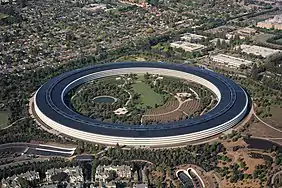
 Microsoft headquarters (western side), Redmond, Washington
Microsoft headquarters (western side), Redmond, Washington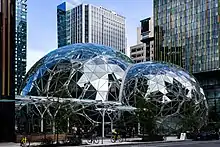 Amazon headquarters, Seattle, Washington
Amazon headquarters, Seattle, Washington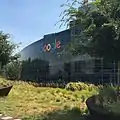 Alphabet (Google) headquarters, Mountain View, California
Alphabet (Google) headquarters, Mountain View, California Facebook headquarters, Menlo Park, California
Facebook headquarters, Menlo Park, California
See also
References
- "The Economics of Big Tech". Financial Times. March 29, 2018. Retrieved June 6, 2019.
- "We're Stuck With the Tech Giants. But They're Stuck With Each Other". New York Times. November 13, 2019. Retrieved April 22, 2020.
- Johnson, Mark W. (July 24, 2020). "Do the U.S.'s Big Four Tech Companies Have a Vision for the Future?". Harvard Business Review. ISSN 0017-8012. Retrieved September 20, 2020.
- "The Four: The Hidden DNA of Amazon, Apple, Facebook, and Google". www.amazon.com. Retrieved August 28, 2020.
- Swisher, Kara (July 1, 2020). "Opinion | Here Come the 4 Horsemen of the Techopolypse". The New York Times. ISSN 0362-4331. Retrieved August 28, 2020.
- "The 'Big Five' Could Destroy the Tech Ecosystem". Bloomberg.com. November 15, 2017. Retrieved August 28, 2020.
- "The S&P 500 is really the S&P 5. Big tech dominates the index". CNN. February 11, 2020. Retrieved August 18, 2020.
- "Animal Spirits: The S&P 5". The Irrelevant Investor. August 5, 2020. Retrieved August 27, 2020.
- "The S&P '5'". www.fa-mag.com. Retrieved August 27, 2020.
- "Most Valuable Companies in the World - 2020". FXSSI - Forex Sentiment Board. Archived from the original on January 27, 2020. Retrieved January 27, 2020.
- Bursztynsky, Jessica (August 19, 2020). "Apple becomes first U.S. company to reach a $2 trillion market cap". CNBC. Retrieved October 15, 2020.
- It's almost impossible to function without the big five tech giants
- Rey, Jason Del (February 6, 2020). "Why Congress's antitrust investigation should make Big Tech nervous". Vox. Retrieved February 21, 2020.
- PYMNTS (December 11, 2019). "DOJ To Wrap Up Probe Into Big Tech In 2020". PYMNTS.com. Retrieved February 21, 2020.
- GmbH, finanzen net. "The DOJ's latest probe erased $33 billion from Amazon, Apple, Facebook, and Google | Markets Insider". markets.businessinsider.com. Retrieved February 21, 2020.
- "Is Margrethe Vestager championing consumers or her political career?". The Economist. September 14, 2017. Retrieved June 26, 2020.
- Privacy, power and censorship: how to regulate big tech
- Yglesias, Matthew (May 3, 2019), The push to break up Big Tech, explained
- Spross, Jeff. "Facebook and Google are free. They shouldn't be". theweek.com. Retrieved January 22, 2021.
- "What are the Four Big Tech Companies in the US?". WorldAtlas. Retrieved January 27, 2020.
- "GAFA Approach to Digital Banking Transformation - Accenture". www.accenture.com.
- ""The Four Horsemen" – An Interview with Scott Galloway". Retrieved October 15, 2020.
- Simon, Phil (October 22, 2011). The Age of the Platform: How Amazon, Apple, Facebook, and Google Have Redefined Business (1 ed.). Motion Publishing. p. 312. ISBN 9780982930250.
- Schonfeld, Erick (May 31, 2011). "Eric Schmidt's Gang Of Four: Google, Apple, Amazon, And Facebook – TechCrunch". techcrunch.com. Archived from the original on May 25, 2019. Retrieved May 25, 2019.
- "Eric Schmidt's "Gang Of Four" Doesn't Have Room for Microsoft". AllThingsD.
- Waters, Richard (July 27, 2018). "Move over Faangs, make way for Maga". Financial Times. Retrieved November 18, 2018.
- Stevens, Pippa (April 26, 2019). "Four 'MAGA' stocks are worth a combined $4 trillion. Here's the one to own, say two experts". CNBC. Archived from the original on January 1, 2020. Retrieved January 27, 2020.
- "Move over FAANG, here comes MAGA - The tech giants are still in rude health". The Economist. August 4, 2018. Retrieved January 27, 2020.
- 김제림 (Kim Je-rim) (May 29, 2019). "'FAANG' 지고 'MAGA' 시대 온다 ("FAANG" is losing and "MAGA" is coming)". 매일경제 (in Korean). Retrieved January 27, 2020.
- Smyrnaios, Nikos (2016). "L'effet GAFAM : stratégies et logiques de l'oligopole de l'internet" [The GAFAM effect: Strategies and logics of the internet oligopoly]. Communication et langages (in French). NecPlus. 188. doi:10.4074/S0336150016012047. ISSN 0003-5033. Archived from the original on July 13, 2019. Retrieved July 13, 2019.
- "The Price of "FAAAM" - 5 Tech Stocks Now Worth Over $4 Trillion". Peridot Capital Management LLC. Retrieved August 23, 2020.
- Grant, Kinsey (September 26, 2017). "FANG Stocks Are Getting Their Own Index". The Street.
- Frankel, Matthew (September 29, 2017). "What Are the FANG Stocks?". Motley Fool. Retrieved August 11, 2018.
- "FAANG" Retrieved October 27, 2020.
- Damodaran, Aswath (August 21, 2020). "The Strong (FANGAM Stocks) Get Stronger!". ValueWalk. Retrieved August 23, 2020.
- Greven, Mark & Wei Wei (October 17, 2017). "Meet China's new tech giants: Alibaba, Baidu, Tencent and Xiaomi". The Telegraph. Retrieved October 13, 2019.
- "Biggest Chinese tech companies: From Alibaba and Huawei to Tencent". NS Business. February 4, 2019. Retrieved October 15, 2019.
- Chen, James. "BATX Stocks". Investopedia. Retrieved October 17, 2019.
- Hooker, Lucy; Palumbo, Daniele (May 20, 2019). "Why Huawei matters in five charts". Retrieved October 15, 2019.
- "Top 7 Chinese Tech Companies". www.chinawhisper.com. Retrieved October 23, 2019.
- The 'Big Five' Could Destroy the Tech Ecosystem
- How 5 Tech Giants Have Become More Like Governments Than Companies, October 26, 2017
- Clifford, Tyler (May 6, 2020). "Facebook, Alphabet and Amazon are in a 'three-horse race' in advertising, Jim Cramer says". CNBC.
- "Desktop Operating System Market Share Worldwide, Jan 2020". StatCounter GlobalStats. Archived from the original on January 27, 2020. Retrieved January 27, 2020.
- Vargas, Cristina (October 25, 2019). "Cloud Market Share 2019: AWS vs Azure vs Google – Who's Winning?". Skyhigh Networks (McAfee). Retrieved January 27, 2020.
- Jason Paul Whittaker (February 11, 2019), "Introduction", Tech Giants, Artificial Intelligence, and the Future of Journalism (Open Access), Routledge
- Apple, Google and a Deal That Controls the Internet The New York Times, 2020
- "FTC to Examine Past Acquisitions by Large Technology Companies". Federal Trade Commission. February 11, 2020.
- "FTC's Bureau of Competition Launches Task Force to Monitor Technology Markets". Federal Trade Commission. February 26, 2019.
- Dieterle, David. Government and the Economy. ISBN 978-1-4408-2903-1.
- "Why the Consumer Welfare Standard Should Remain the Bedrock of Antitrust Policy" (PDF). Information Technology & Innovation Foundation. October 5, 2018.
- "Investment Heroes 2019: Boosting U.S. Growth". Progressive Policy. December 12, 2019.
- "Five myths about antitrust law". Washington Post. March 20, 2020.
- Cox, Kate (January 9, 2021). "House: Amazon, Facebook, Apple, Google have "monopoly power," should be split". Ars Technica. Retrieved January 9, 2021.
- Investigation of Competition in Digital Markets (PDF) (Report). United States House of Representatives. January 2021.
- The Verge, June 16, 2020 EU Opens Apple Antitrust Investigations into App Store and Apple Pay practices
- Open Markets Institute, The Corner Newsletter, June 25, 2020, Open Markets Examines the European Commission's Newly Announced Investigation into Potentially Anti-competitive Practices by Apple
- Parliament of the European Union, Hearing of Margrethe Vestager 8 Oct. 2019 p. 28
- Pisani, Bob (October 3, 2017). "We are letting Amazon and Apple 'avoid taxes, invade privacy, and destroy jobs,' says NYU professor". CNBC.
- Bougon, François (May 21, 2019). "Face aux Gafam, les députés adoptent le droit voisin" [Members of Parliament pass a related rights law against GAFAM] (in French). Le Monde. Archived from the original on May 25, 2019. Retrieved May 26, 2019.
- "Conservatives Are Gearing Up to Falsely Blame Big Tech Censorship for Trump's Loss". Slate. January 8, 2020. Retrieved January 12, 2021.
- "Conservative groups leveraging Big Tech hearing for political change". Washington Times. July 30, 2020. Retrieved January 12, 2021.
- "Trump Blames 'Big Media, Big Tech' as he Rails Against Election 'Fraud' Without Evidence". Washington Times. November 5, 2020. Retrieved January 12, 2021.
- "This is what Trump told supporters before many stormed Capitol Hill". ABC News. Retrieved January 10, 2021.
The fake news and the big tech, big tech, is now coming into their own. We beat them four years ago, we surprised them. We took him by surprise and this year they rigged an election, they rigged it like they have never rigged an election before, and by the way, last night, they didn't do a bad job either, if you notice. I am honest, and I just again, I want to thank you. It's just a great honor to have this kind of crowd and to be before you and hundreds of thousands of American patriots who are committed to the honesty of our elections and the integrity of our glorious Republic.
- "Angela Merkel finds Twitter halt of Trump account 'problematic'". Telegraph. January 11, 2021. Retrieved January 12, 2021.
- "'Problematic': Germany's Angela Merkel calls out Twitter over Trump ban". Global News. January 11, 2021. Retrieved January 12, 2021.
- Roose, Kevin (December 11, 2017). "The Alt-Right Created a Parallel Internet. It's an Unholy Mess". The New York Times. ISSN 0362-4331. Retrieved September 4, 2020.
- Cogley, Michael (July 6, 2020). "'Alt-tech' attracts growing number of extremists in Britain". The Daily Telegraph. ISSN 0307-1235. Retrieved September 4, 2020.
- Ellis, Emma Grey (September 27, 2017). "Red Pilled: My Bizarre Week Using the Alt-Right's Vision of the Internet". Wired. ISSN 1059-1028. Retrieved September 4, 2020.
- Malter, Jordan (November 10, 2017). "Alt-Tech platforms: A haven for fringe views online". CNN Money. Retrieved September 4, 2020.
- Sterling, Bruce (March 15, 2019). "The Big Nine G-MAFIA BAT". Wired. Retrieved August 10, 2019.
- Ponciano, Jonathan (May 15, 2019), "The Largest Technology Companies In 2019: Apple Reigns As Smartphones Slip And Cloud Services Thrive", Forbes
External links
| Wikiquote has quotations related to: Big Tech |
